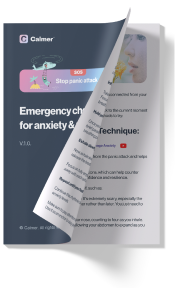- Opening up is a process and, as such, doesn’t have to happen overnight
- Having a supportive and trustworthy person to talk to makes all the difference
- Start small to build confidence and trust over time
- Believe that change is possible and focus on the possibilities, not limitations
I’ll be 41 this year, and for most of my life, I’ve been suffering in silence. I’ve been carrying a heavy burden all by myself and didn’t let anyone else know what I was going through.
And I can tell you that carrying all that weight on your shoulders is tough. But I’m sure you know that all too well yourself.
And you know what? It’s never too late to start opening up. Sharing your struggles with someone you trust can make all the difference.

It might feel scary at first, but imagine how freeing it could be to finally let go of that burden and let others in on what’s happening with you.
So join me as I let you in on my journey and what helped me finally break free from that silent suffering and start living a more open and authentic life.
Admit You Have an Issue
Many people suffer in silence. Some of them have mental issues like depression and anxiety, while others don’t but still can’t open up to others to share their thoughts and emotions freely.
But the very first step in opening up is admitting to yourself you have an issue, right?
Admitting to yourself and others that you’re struggling takes courage, but it’s also the first step toward getting the help and support you need.
That’s why I started the very simple habit of journaling my thoughts, feelings, and behaviors. Very quickly, this 5-minute-a-day routine helped me to flesh out all my anxieties and fears.

And here’s the thing: I quickly learned that the people I trusted and who cared about me appreciated my honesty and were there to support me through the things I was facing.
You don’t have to go through it alone. Opening up is a sign of strength, not weakness.
Let go of Your Desire to be in Control
The second step for me was to finally let go of my desire to be in control at all times. I now see it as an important step to ending my silent suffering and opening up.
The truth is, trying to control everything holds you back from forming deeper bonds and finding the support you need.
When you surrender that need for control, you free yourself up to be more open and vulnerable with yourself and others.
You’re basically giving yourself permission to let go of that weight and welcome the uncertainty of opening up.
Here are three tips to help you let go of the desire to be in control:
- Accept that there are some things in life that you can’t control
- Let go of the idea that everything has to be perfect
- Recognize that it’s okay to ask for help and delegate tasks to others
But here’s the thing: if you don’t believe you can get better, you won’t get better. It’s as simple as that.
Believe That You Can Get Better
As almost a lifelong pessimist, I saw only the worst in others, in myself, and society at large.
I had a fixed mindset that nothing can change and that things are set in stone. That’s why I never believed I could get better.
But you know what? That fixed mindset can be shifted. It’s like flipping a switch from “can’t” to “can.”
It might take some work, but believing that you can get better is one of the first steps toward actually making it happen.
Instead of focusing on all the reasons why you can’t change, start looking for evidence that you can.
Surround yourself with positive influences, set small, doable goals, and celebrate your progress along the way.
Find the Right Person to Talk to
Finding the right person to talk to and open up to is incredibly important. Ideally, you want to speak to someone who won’t judge you or brush off what you’re going through.
And believe me, that’s going to happen more often than not. Even the people you think are empathetic and who you feel will understand you can be ill-equipped to deal with someone who opens up to them.
It’s simply overwhelming for them, too.
You need to find a friend, family member, therapist, or support group who will have your back and be in your corner.
So, trust your instincts, and don’t be afraid to test the waters before diving in completely.
Having the right person to talk to can make all the difference and be the final nail in the coffin of silent suffering.
Here’s a quote that really resonated with me that I found on Reddit:
You really have to implement this in your own circles if you haven’t already. It takes work. It takes being insulted. It takes vulnerability on your part before others show it. You cannot wait to be permitted to do it. You, personally, have to do it.
I have the fucking fantastic friendships I have now (and plenty of them) because I did the fucking work, laid myself down, and allowed others to do the same. This isn’t going to come down to one popular man talking about his issues, it’s going to always come down to common people having real conversations and realizing, and accepting that the current state of affairs sucks.
Whiskey-Leg @ Reddit
Start Small
Starting small is not only okay, but it’s often the best way to begin opening up. You’re basically dipping your toe in the water before diving in headfirst.
That’s why sharing something small and manageable allows you to test the waters and estimate the other person’s reaction without feeling overwhelmed.
Plus, it can build trust and confidence over time, making it easier to open up about bigger things later on.
Opening up is a process, and starting small is a great way to ease into it.
Final Thoughts
And that’s it. Things will slowly start falling into place, and you just have to continue working on opening up and sharing your emotions so you don’t fall into the silent suffering trap again.
Just keep focusing on being kind to yourself, reaching out for support when you need it, and staying committed to your growth and healing.
The Calmer Anxiety Relief app can be a helpful tool in this case, too. Using the app regularly can help you develop coping strategies for managing stress, challenging negative thought patterns, and promoting a more positive mindset.




